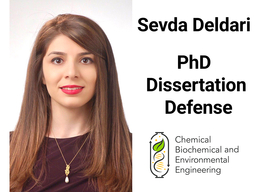PhD Dissertation Defense Announcement: Sevda Deldari
Location
Technology Research Center (TRC) : 206
Date & Time
January 2, 2020, 1:00 pm – 2:00 pm
Description
Title
PURIFICATION METHODS DEVELOPED FOR ON-DEMAND THERAPEUTIC GRADE PROTEINS
Sevda Deldari, PhD Candidate
Advisors
Douglas D. Frey
Professor, Department of Chemical, Biochemical and Environmental Engineering
Govind Rao
Professor, Department of Chemical, Biochemical and Environmental Engineering
Abstract
For personalized medicines, national emergencies, military operations, and related applications there is a growing need to produce single-dose levels of therapeutic proteins at the point of care. To satisfy this need, the “biologically-derived medicines on demand” (Bio-MOD) device has been developed, which is an integrated and portable continuous bioprocessing system. For the upstream processing of this device, a cell-free expression system is utilized which provides less than 0.5% purity in the harvest. For the downstream processing component of this device, an intensified method is required not only to provide more than a 10,000-fold host cell protein (HCP) reduction factor, but also to offer a fast, simple, and cost-effective separation. The focus of this thesis is the development of an intensified downstream process for the Bio-MoD that is based on either a mathematical or a chemical approach. For the mathematical approach, a 3-D fine-grained finite-element mechanistic model is developed using COMSOL Multiphysics for the chromatography processes of the Bio-MoD device. The model is validated using both analytical and experimental methods and can efficiently explore the parameter space affecting the performance of the chromatography processes. For the chemical approach, an affinity capture method implemented with a simple design of experiment procedure is used as a generic element of the purification method for the Bio-MOD device. In order to produce a biosimilar without any additional tag on the product, the intensified separation technique of chromatofocusing optimized using computer simulations is employed as a non-affinity capture step. The results obtained show that, through the use of computer simulations, a non-affinity capture step can be made sufficiently “generic” to be a useful alternative for the Bio-MOD device. Finally, the concept of ion-exchange (IEX) chromatofocusing is applied on an immobilized metal affinity chromatography (IMAC) column in order to improve the purity by performing polishing at the same time as the capture step.
Location:
Technology Research Center, Room 206, 5200 Westland Blvd Baltimore, MD 21227
